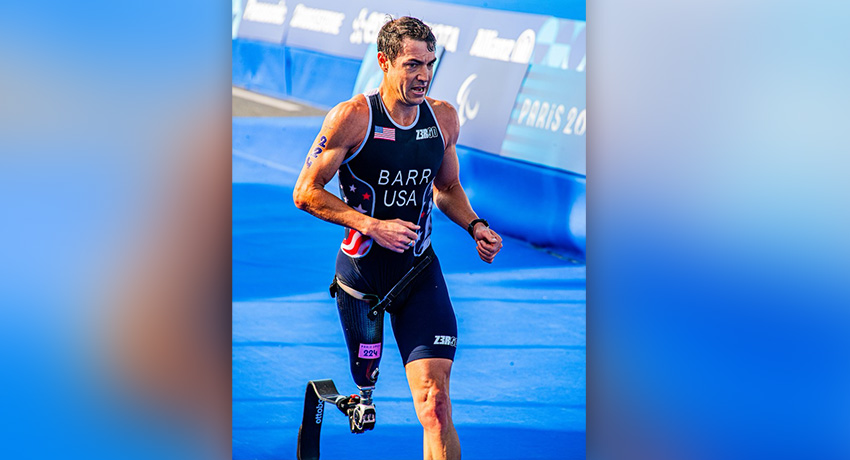After years of avoiding extreme sports and the risk of injury, Mark Barr tore his medial meniscus in 2021 while fishing in Galveston Bay. It was beyond ironic for this collegiate athlete and Paralympian who has endured rigorous triathlon training since 2004. But for Mark, whose right leg was amputated at age 14 due to bone cancer, this common knee injury to his remaining leg was serious and life-altering.
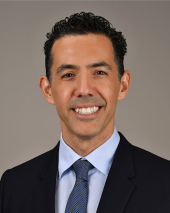
It was a hot summer day, and Mark hadn’t caught any fish. He decided to jump in the water to at least enjoy a swim. He removed his prosthetic leg and threw himself over the edge of the boat. What he didn’t realize was how shallow the murky water was. His leg was at an angle when his foot hit the mud.
“I thought I tore everything,” said Mark. “It was immediately painful and swollen. I’ve got one good knee and want to keep it as long as possible.”
Mark immediately scheduled an appointment with Steven E. Flores, MD, an orthopedic surgeon with UT Physicians Orthopedics at Memorial Hermann | Rockets Sports Medicine Institute – Texas Medical Center. An MRI revealed a medial meniscus tear.
Navigating treatment options
Patients with a meniscus tear have several options, depending on the severity, their age, and their overall health. One option is to do nothing — if the tear is small and isn’t causing pain or impacting daily activities. Orthopedic surgeons also can perform knee surgery to repair the tear or remove the damaged portion of the meniscus. Flores said there are pros and cons with each treatment option. The possibility of arthritis developing in the knee is also considered.
Due to Mark’s age (nearly 35) and need for a strong “solo” leg, Flores took into account long-term function and degenerative issues as he planned the best treatment.
“Our conversation about treatment was more in-depth because of his limitations after surgery,” said Flores, assistant professor of orthopedic surgery at McGovern Medical School at UTHealth Houston. “He didn’t have a ‘normal’ opposing leg to rely on after surgery with six weeks of non-weight-bearing recovery. We talked through the dynamics of aftercare to create a plan for daily life after surgery.”
Repairing the tear for a strong future
Flores repaired Mark’s meniscus just days later, securing it with 11 stitches. Fortunately, Mark had no other knee damage.
“The surgery was a bit more extensive than others might have done for his injury, but we wanted to give him the best outcome,” Flores said.
At the time, Mark lived in a second-floor duplex with no elevator. Imagine navigating stairs to your front door with a crutch and a prosthetic leg as your good leg for six weeks. His work-around included a tricep pushup: leaning on the arm rail and pushing up with one hand on a crutch and standing on his prosthesis. Mark described it as a humbling experience.
“Honestly, I thought there was no way I was going to be able to run again,” Mark said. “It took such a long time to recover. It would swell up just standing at work.”
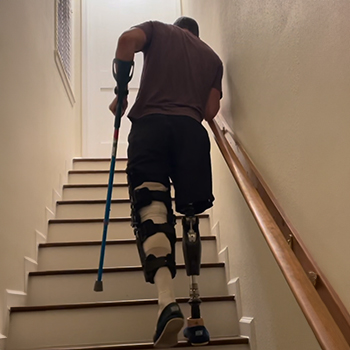
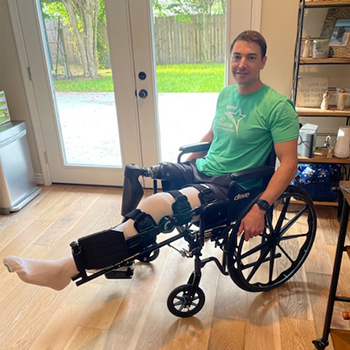
Mark pursued a certified registered nurse anesthetist (CRNA) degree in 2019 and balanced school with his recovery in 2021. He said it was a blessing in disguise that he was in school then so that he couldn’t push his knee too hard with Paralympic training.
Mark went for physical therapy three times a week for three weeks until his school schedule demanded more of his time, and he had to do therapy on his own. Dedicated to his recovery, he added swimming and biking at the UTHealth Houston Recreation Center, which he kept up for many months.
“Swimming was awesome because it’s non-weight-bearing and allowed me to get some decent exercise in,” Mark said. “I think having a triathlon background was extremely beneficial because cycling and swimming are part of the physical therapy for a knee injury. It felt great to get in the pool and work my knee through the range of motion.”
Flores said Mark was dedicated and appropriate by not pushing for too much too soon.
“I admire Mark and his resilience. Not only from his knee surgery and recovery but also to training and getting back to his fitness level – and even exceeding it,” Flores said.
Pursuing a dream
Growing up, Mark never let his prosthetic leg define his capabilities. While in college, he swam for Cal Poly in San Luis Obispo, California. He competed in swimming at the Paralympics in Athens (2004) and in Beijing (2008), and later in Rio de Janeiro (2016) in the paratriathlon. He finished fourth each time, never reaching the podium. It remained an incomplete dream.
Mark started throwing out the idea to his trainer about trying to qualify for the Paris 2024 Paralympic Games. Mark said deep down he didn’t know if it was actually a possibility, but he wanted to try.
“It was pretty scary at first because you don’t know what you don’t know,” Mark said. “Only having one leg, what is this going to look like for me? Then, as time went on, I got more optimistic about what was possible.”
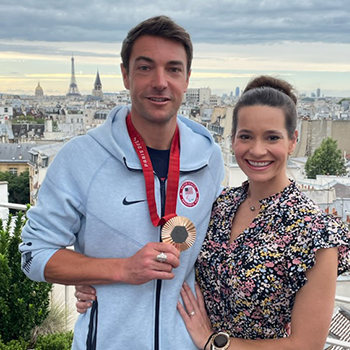
Determined to finish his Paralympic journey, Mark transitioned to the Olympic Training Center in Colorado Springs for a four-week stint. It was a positive step in his training journey with on-site physical therapy, doctors, and all the recovery tools, such as ice bath, sauna, hot tub, and massage.
About a year after his knee surgery, Mark raced in the 2022 World Triathlon Para Cup in Portugal. He said getting back into a competition was awesome but different. In his last World Championship race in 2018, he went out on top with a first-place finish in each series. Four years later, he returned and literally was at rock bottom. His biggest goal was not to injure himself.
“I had a good outcome after meniscus surgery,” Mark said. “Had I not had a good outcome, I wouldn’t have been able to put my knee through all the stress required to be a Paralympic athlete.”
Mark successfully completed his trial competitions, earning a spot with Team USA in the 2024 Paris Paralympics. His paratriathlon race included a 750-meter swim in the Seine, a 20-kilometer bike ride along the Champs-Élysées, and a 5-kilometer run. Mark earned a bronze medal, achieving his dream after 20 years.
Flores said seeing patients return to their goals and desires is always rewarding.
“I’m proud of what Mark accomplished,” said Flores. “It’s rewarding to know he achieved a lifelong dream, and I played a small part in that.”

